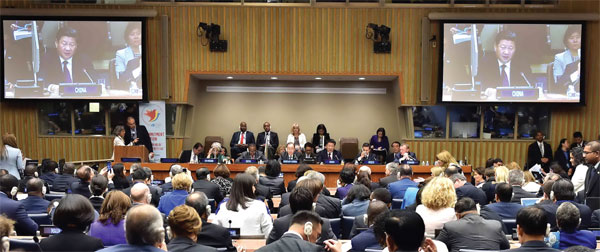 |
|
President Xi Jinping delivers a speech at the Global Leaders' Meeting on Gender Equality and Women's Empowerment at the UN headquarters in New York on Sunday.? [Photo/Agencies] |
The series of meetings at the UN Headquarters from Sept 25 to 28 to mark the 70th anniversary of the founding of the United Nations will have a huge impact on international relations, the future role of the world body and the direction of global cooperation.
Over the years, the UN, established after the world's victory over fascism, has played the principal role in maintaining peace and development across the globe. And as the most representative and authoritative intergovernmental body, the UN has promoted human progress, with peace and security, development, and human rights being its three pillars.
Seventy years on, the UN Charter remains as relevant as ever. The meeting at the UN headquarters in New York offered the world community a golden opportunity to review the spirit of the charter and enrich it with new connotations that comply with the trends and needs of our times.
But despite all the great achievements, the UN Charter has not yet been implemented in its entirety. Peace and stability is still a luxury for people in some countries in the Middle East and North Africa. One out of every 122 people in the world is displaced either in his/her country or abroad as a refugee. And some 750 million adults can't read or write, with two-thirds of them being women.
These formidable challenges to peace and development make it necessary to uphold the lessons learned from the war against fascism, and rally maximum support for maintaining peace and stability across the globe. And one of the most valuable lessons for peace and justice from that war is to steadfastly uphold the postwar world order and strictly adhere to historical facts.
As a permanent member of the UN Security Council, China remains committed to observing the doctrines and principles of the UN Charter, peace and justice in particular. As the UN enters a new era, China hopes it plays a bigger role in ushering in a new mode of international relations with win-win cooperation at its core.
The new mode should abide by the basic norms governing international relations, especially equality, justice, mutual respect and non-interference in other countries' internal affairs. Also, it should promote multilateralism and cooperation.
To cope with the changing global realities, the role of the United Nations must be strengthened, because a stronger UN can shoulder more responsibilities and bring countries closer to build a better future for all.